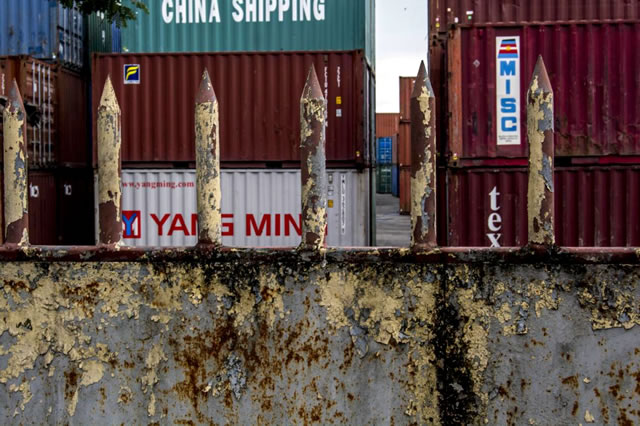Cleaning Up Corruption in Myanmar

In a large, plain government office on the outskirts of Yangon, Frontier has visited to ask about corruption.
This excerpt is reproduced from an article published on FrontierMyanmar.net. Frontier Myanmar is an English-language weekly magazine.
The NLD government says fighting corruption is a priority but tackling the problem will require smart strategies, much patience and an acquiescent public service.
In a large, plain government office on the outskirts of Yangon, the official settles into his chair. He slowly undoes the buttons on his daik pone, worn for an urgent meeting earlier that morning with the new regional chief minister, U Phyo Min Thein.
Frontier has visited to ask about corruption. He gives the boilerplate response: there is no corruption in his department now, although it was sometimes an issue in the past.
But one question provokes a more animated and honest response: Do civil servant salaries need to be increased to fight graft?
“Do you even need to ask? Everybody knows the answer,” he said, before turning the question around. “How much do you make a month?” He waits impatiently for the answer, and continues: “I’ve been working here for more than 30 years, I’m a director – and I get only K300,000 (US$255) a month.”
Because it takes place – at least normally – in dark corners, away from public scrutiny, the extent and impact of corruption is hard to quantify. Surveys on the topic have been rare in Myanmar because it was considered taboo until recently.
The most widely cited study is Transparency International’s annual Corruption Perceptions Index, which last year placed Myanmar 147th out of 168 countries – on the same level as Democratic Republic of the Congo and Chad, and above only Cambodia in Southeast Asia.
But some additional research is beginning to emerge that paints a more detailed picture. In 2014, the World Bank conducted an enterprise survey of 642 firms in which 42.9 percent of respondents had been asked to pay a bribe, above the regional average of 35.9 percent, and well above the total average of 17.6 percent. Those surveyed estimated that in 35 percent of all public transactions it was expected they pay a bribe or give a gift – compared to the regional average of 29.3 percent and overall average of 12.9 percent.
Ms Vicky Bowman from the Myanmar Centre for Responsible Business said the World Bank survey arguably provided a better picture of corruption, because it was based on businesses’ real experiences rather than perceptions.
“Overall, I suspect that corruption isn’t much worse than some of Myanmar’s ASEAN neighbours, and may well be better,” she said.
One of the more surprising statistics from the World Bank survey is that few of the businesses surveyed regarded corruption to be a major constraint: just 9.3 percent, below both the regional (16.1 percent) and total (32.8 percent) averages.
Supporting this assessment, several Myanmar business owners told Frontier that they were concerned about the impact of anti-corruption efforts on the economy.
“Without an incentive on top of their salaries, why will civil servants do whatever you want them to do?” asked one. “They will not be willing to work. Already we have to wait too long for everything to be approved.”
Another said, “The NLD wants to control everything. They should focus on encouraging businesses to grow first, because the most important thing is jobs. Look at the police crackdown on bars and massage parlours — this could leave thousands out of work.”
An adviser to the NLD, who asked not to be named, said the leadership knows that civil servant salaries need to be increased, but also that broad pay rises are not immediately affordable – the most recent increase, in 2015-16, put the budget K3 trillion in the red.
Publicly, the party has promised not to embark on large-scale sackings of civil servants, but the adviser said this was dependant on government staff – including workers at state-owned enterprises – being corruption-free and open to retraining as the government seeks to reshape the bureaucracy. The party anticipates many will not meet these criteria, and this will free up room in the budget to increase the salaries of competent and professional government staff over time. “For now, they need to show us they are clean, and we’ll take care of salaries later,” he said.
But there are other elements that could be introduced to this carrot and stick approach to change the corruption game. Bowman calls these “system changes” – basically, ensuring transparency and cutting red tape. For example, if more government processes were handled online through electronic transactions, opportunities for graft would decline dramatically. Similarly, if fees for government services were always clearly stated, users of the services would know if officials were inflating them for personal profit.
“It needs … changes to culture, red tape and regulations, and a move away from the socialist/security control mindset, with its 1984-style requirement for multiple permits and chops, to a more streamlined system that cuts out the people in favour of automated processes,” Bowman said.
ဆက္စပ္ေသာ အေၾကာင္းအရာ
- Handbook on Business Integrity for Myanmar Businesses
- ‘Tone from the Top’ is Essential in Combatting Corruption
- Combatting Corruption in the Private Sector – Regional and Myanmar Developments
- Anti-Corruption Scores Have Improved Under the NLD Government
- Workshop on Building Business Integrity Co-Hosted by MCRB and UNODC
Share:


 English
English မြန်မာ
မြန်မာ မြန်မာ (unicode)
မြန်မာ (unicode)






